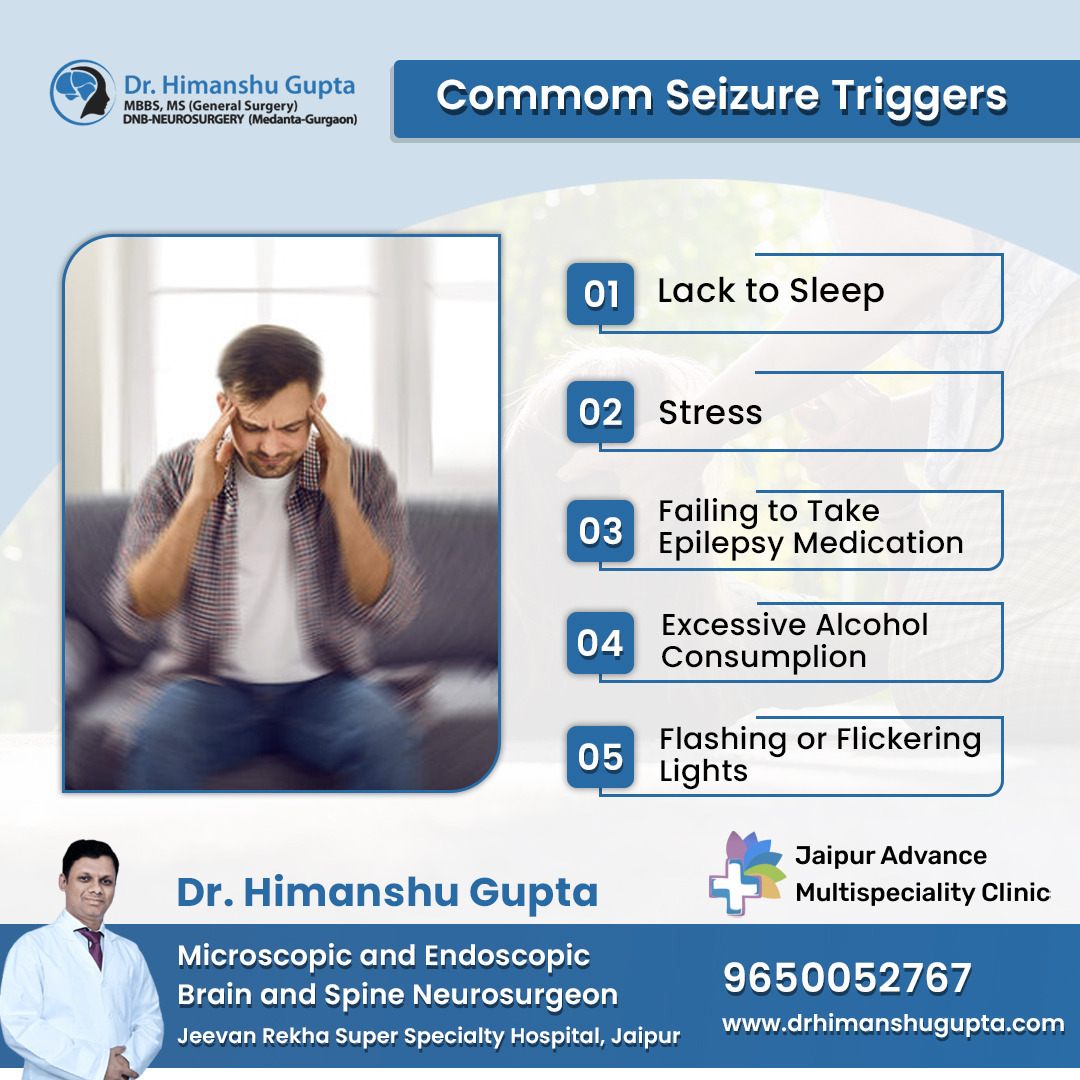Common Seizure Triggers
Common Seizure Triggers: Seizures, characterized by abnormal electrical activity in the brain, can be both frightening and mystifying. They can occur for various reasons, some of which are still not fully understood. However, identifying common seizure triggers can empower individuals living with epilepsy to better manage their condition and reduce the frequency of seizures.
In this blog, we delve into some of the most common Seizure Triggers and explore strategies to mitigate their impact.
Common Seizure Triggers

1. Stress and Anxiety:
Stress is a well-known trigger for seizures in many individuals. Whether it stems from work, relationships, or other life events, heightened stress levels can disrupt the delicate balance of brain activity. Similarly, anxiety, whether generalized or specific, can provoke seizures in susceptible individuals. Employing stress-reduction techniques such as mindfulness, meditation, and regular exercise can be beneficial in managing seizures associated with stress and anxiety.
2. Sleep Deprivation:
A lack of sufficient sleep can significantly increase the likelihood of experiencing seizures. Sleep plays a crucial role in regulating brain function, and disruptions to the sleep-wake cycle can trigger abnormal electrical activity. Establishing a consistent sleep schedule, creating a relaxing bedtime routine, and avoiding stimulants like caffeine before bed can aid in promoting better sleep hygiene and reducing seizure frequency.
3. Flashing Lights and Visual Patterns:
For some individuals, exposure to flashing lights or specific visual patterns can induce seizures, a condition known as photosensitive epilepsy. This sensitivity is commonly associated with video games, strobe lights, and certain television programs. Minimizing exposure to such stimuli and using seizure-prevention techniques such as wearing polarized glasses or using screen filters can help mitigate the risk of seizures triggered by flashing lights.
4. Medication Non-Adherence:
Failure to adhere to prescribed medication regimens is a significant risk factor for breakthrough seizures. Consistent use of anti-seizure medications is crucial for maintaining stable brain activity and preventing seizures. Patients should communicate openly with their healthcare providers about any concerns or difficulties they encounter with their medications to ensure optimal management of their condition.
5. Alcohol and Substance Abuse:
Alcohol and certain recreational drugs can lower the seizure threshold, making individuals more susceptible to experiencing seizures. It is essential for individuals with epilepsy to exercise caution when consuming alcohol and to avoid illicit drugs altogether. Seeking support through counseling, support groups, or substance abuse treatment programs can be instrumental in overcoming addiction and reducing seizure risk.
6. Hormonal Changes:
Hormonal fluctuations, particularly in women, can influence seizure activity. Changes in estrogen levels during the menstrual cycle, pregnancy, or menopause can trigger seizures in some individuals with epilepsy. Close monitoring of hormonal changes and working closely with healthcare providers to adjust medication dosages when necessary can help manage seizures associated with hormonal fluctuations.
7. Illness and Fever:
Certain illnesses, infections, and high fevers can provoke seizures, especially in children with febrile seizures. It is essential to promptly treat underlying illnesses and take measures to reduce fever, such as administering fever-reducing medications and employing cooling techniques like tepid sponge baths. Monitoring symptoms closely and seeking medical attention if seizures occur during illness is crucial for proper management.
Also Read:
8. Overexertion and Fatigue:
Intense physical exertion or extreme fatigue can trigger seizures in some individuals. It is essential to strike a balance between staying active and avoiding excessive strain on the body. Engaging in regular exercise at a moderate intensity level and prioritizing adequate rest and recovery can help prevent seizures associated with overexertion and fatigue.
In conclusion, while the triggers for seizures may vary from person to person, identifying and understanding common seizure triggers can empower individuals with epilepsy to take proactive steps towards managing their condition effectively. By implementing lifestyle modifications, adhering to medication regimens, and seeking appropriate support, individuals with epilepsy can minimize the impact of triggers on their seizure frequency and lead fulfilling lives.
Looking For The Best Neurosurgeon In Jaipur For Seizure Treatment?
Book an appointment with Dr. Himanshu Gupta - The Best Neurosurgeon in Jaipur, City, who provides the best brain and spine surgery and treatment call at +91-9650052767.
Additionally, maintaining open communication with healthcare providers and staying informed about advancements in epilepsy management can further enhance seizure control and overall well-being.
Also Read:




_1634735781.webp)
_1634735795.webp)